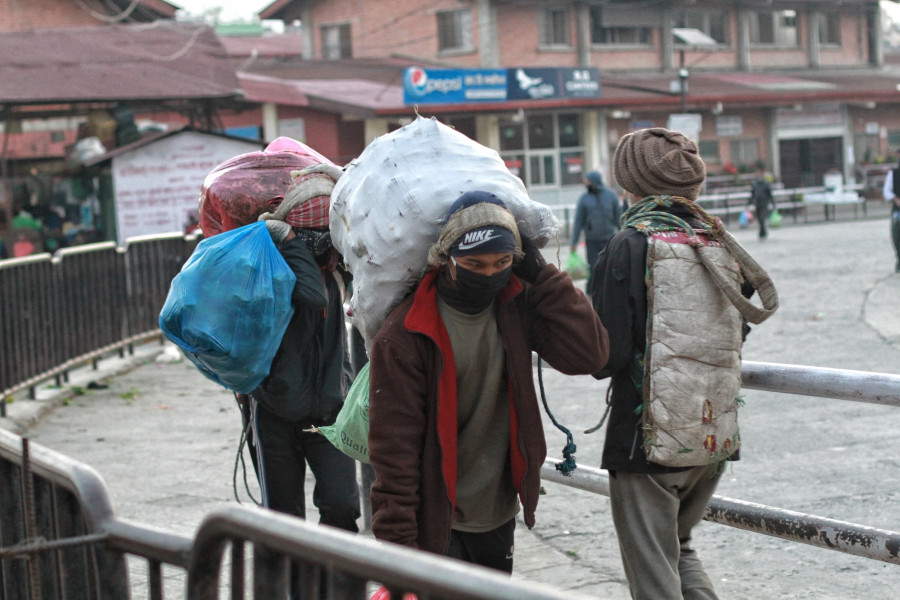Money
Relief package may not be enough if Covid-19 crisis worsens, say businessmen and experts
Economists question the government’s decision to ask landlords to provide a month's rent exemption to informal sector workers, who live in small houses that are not usually registered for rental tax.
Prithvi Man Shrestha
Leaders of the private sector and experts say that the relief package unveiled by the government and the central bank has sought to address the needs of certain targeted groups, and warn that it may not be enough if the Covid-19 pandemic continues to spread unchecked globally and locally.
A Cabinet meeting on Sunday decided to provide a relief package to the people and businesses most affected by the slowdown in economic activities and nationwide lockdown enforced to prevent the possible spread of Covid-19.
An aid scheme for daily wage and informal sector workers to be provided through the local governments, postponement of the deadline for payment of income tax and value added tax till mid-May, jobs under the Prime Minister Employment Programme for grounded migrant workers, and partial exemption on electricity and internet bills are among the measures announced by the government on Sunday.
Nepal Rastra Bank also announced a package for businesses affected by the lockdown. Some of the measures include deferral of the loan repayment deadline to mid-July for borrowers due to pay in mid-April, prohibition preventing banks from charging penal interest and fees on such delays, and easier and faster credit for enterprises affected by Covid-19.
Shekhar Golchha, senior vice-president of the Federation of Nepalese Chambers of Commerce and Industry, said that the package largely mirrored the recommendations made by the private sector.
“But the situation is deteriorating. Businesses, particularly small and medium enterprises, might require more support from the government,” he said. “Small and medium enterprises will require cheaper finance and tax rebates to survive.”
The government has not announced any tax exemptions for sectors affected by the pandemic. The central bank has long been providing refinance facilities for productive sectors such as export industries, tourism and many industries related to the manufacturing sector.
The central bank offers two types of refinance facilities—general and special. Under the general refinance category, borrowers can get loans at a maximum interest rate of 7 percent; and under special refinance, borrowers can get credit at a maximum interest rate of 4 percent.
On Sunday, the central bank decided to increase the refinancing fund to Rs60 billion from the current Rs50 billion to support Covid-19 affected sectors, particularly small and medium enterprises.
The conditions for obtaining the refinancing facility are very complicated and impractical, so businesses are having a hard time getting it, Golchha said.
Tourism is the hardest hit area by the novel coronavirus outbreak as it affected airlines, hotels and the travel, tour and trekking sectors badly.
“The government’s relief package is inadequate, given the damage caused to the tourism sector by the pandemic,” said Binayak Shah, first vice-president of Hotel Association Nepal. “As the hotels are not operating, we are worried about how to pay the salary of our staff.”
According to the association, there are more than 500,000 hotel employees, and almost all of them are on leave as the hotels have shut down for lack of guests. The government has, however, said that tourism enterprises must pay the salary for the month of Chaitra to their employees.
Employers can access the organisation-level welfare fund to pay their employees until business resumes
Shah said that they expected the government to use the resources in the social security fund to contribute a certain amount for the staff salaries of hotels considering the damage caused to the sector by the Covid-19 pandemic.
The government has been collecting social security tax since 2010.
Although local airlines had also sought a sector-specific relief package, this was not done.
According to some experts, the relief package for daily wage workers has come too late. Economist Keshav Acharya said that the plan should have been announced earlier as these labourers are already facing a food problem after being out of work for so long.
Local units will collect the family details of daily wage workers before issuing them the government assistance.
“But the federal government has not said what type of food or how much will be distributed to them, and this may delay the relief distribution,” he said.
Before the federal government’s decision, some local governments such as Kathmandu Metropolitan City and Lalitpur Metropolitan City had already announced their own relief packages for daily wage earners.
Acharya also questioned the government’s decision to ask landlords to provide a month's rent exemption to informal sector workers in exchange for a rental tax exemption.
“Daily wage workers such as porters and rickshaw pullers usually live in slums and small houses whose landlords are usually not registered for rental tax. So the provision is impractical,” he said.




 14.24°C Kathmandu
14.24°C Kathmandu















